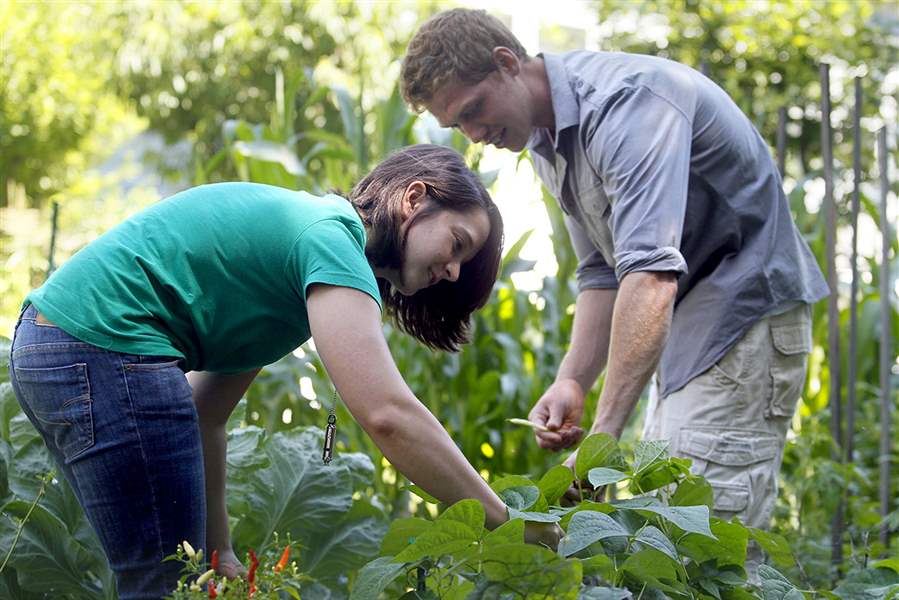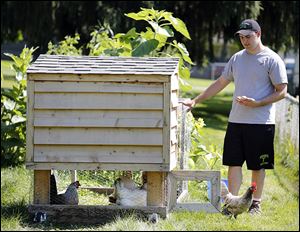
ORGANIC FARMING OPPORTUNITIES CROP UP IN TOLEDO
City is ripe for program that teaches agriculture
8/2/2013
Former WWOOF member Kaitlyn Bailey of Dayton and current WWOOF member Sean Smith pick beans on City Councilman Steven Steel’s cropland, an oasis in the middle of the Old West End.
THE BLADE/AMY E. VOIGT
Buy This Image

Former WWOOF member Kaitlyn Bailey of Dayton and current WWOOF member Sean Smith pick beans on City Councilman Steven Steel’s cropland, an oasis in the middle of the Old West End.
Knees firmly bent down, Sean Smith smiled as he started feeding a brood of chickens out of a Coors Light plastic pitcher filled with grain and seeds. Soon, he turned away from the coop and walked over to a nearby garden to pick fresh beans as the afternoon sunlight began to beat down on his back.
A recent college graduate from Georgia, Mr. Smith will spend a year harvesting fruit and vegetables, tending to chickens and bees, and pruning apple and plum trees — all of this while living on a farm in the heart of the city of Toledo.
Mr. Smith, 24, found his way to Toledo through a global movement known as WWOOFing, or World Wide Opportunies on Organic Farms.
Born in the United Kingdom in 1971, the idea has evolved over the years into an international network that connects travelers with organic farmers who are willing to offer room and board in exchange for volunteer work on their land.
The advent of the Internet and the boom in social networking helped membership skyrocket. With thousands of farms in more than 50 countries, WWOOF offers penniless college students, adventurous wayfarers, and farming enthusiasts an economical gateway to travel around the globe and learn about organic agriculture.
In the United States alone, the movement includes more than 13,500 active members and 1,600 farms spread across the country. Of these, only 20 organic farms are in Ohio, and two are in Toledo, specifically.
Crowds of green-minded globetrotters have become regulars on Michael Horst’s farm in West Toledo, the other WWOOF site in the area.
Mr. Horst, a 23-year-old Sylvania native, moved to his new home on Marriat Road about three years ago. But it wasn’t until this January that he created a profile on the WWOOF Web site, opening the 2,900-square-foot yard behind his house to farming enthusiasts from all over the world.
Since then, he has encountered dozens of people from all sorts of backgrounds: free-spirited vegans looking for locally produced food, cyclists crisscrossing the country, bands on tour making a stopover, and even a Southern Baptist minister.
For Mr. Horst, the diversity of population is one of the many perquisites of being a host, as “every visitor makes his little contribution to the farm.”
Thanks to their help, Mr. Horst has learned new gardening practices, like the Native American tradition of interplanting corn, beans, and squash in the same mounds to enhance the soil’s fertility, and he has been able to expand the crops in his backyard.
For Mr. Horst, gardening has been a lifelong pastime: He calls it “a stress-relieving activity” that allows him to take a break from unhealthy “gas-station food” while saving money. Now, through the movement, gardening also can be a gateway to the world.

Michael Horst raises chickens at his Toledo home, where he hosts volunteers from World Wide Opportunities on Organic Farms.
“You can grow macadamia nuts in Hawaii, harvest oranges in Florida, or even visit a farm in New Zealand,” he said. “That’s why WWOOFing is so great.”
Nestled within the tree-shaded streets and eclectic mansions of the the city’s Old West End is Mr. Smith’s home for the next twelve months.
Here, he will be lodging with Toledo City Councilman Steven Steel and his wife Catherine Hernandez, in their Parkwood Avenue residence.
Two lifetime organic farmers, Mr. Steel and his wife decided to become hosts in June, 2011, to share their knowledge of sustainability and urban agriculture with younger people.
“It’s more than just farming,” Mr. Steel said. “It’s about living an intensive, sustainable lifestyle in an urban space.”
Over the years, the councilman has turned nearly every inch of his 2,200-square-foot backyard into an organic oasis in the heart of the city. Just 50 feet from the street, tufts of fresh basil grow next to clusters of tomatoes, raspberry bushes, a coop with seven chickens, and two hives housing 60,000 Italian bees.
A strong opponent of pesticides and synthetic fertilizers, Mr. Steel said additional human labor is always necessary to compensate for the lack of chemicals.
“That’s where the WWOOFers come in useful: They are not only learning from us but also contributing to the farm,” he said.
At any given month of the year, Mr. Steel and his wife host one or two WWOOFers in their house. The majority of these, they said, have been recent college graduates or college-aged students interested in living an environmentally friendly lifestyle before deciding their next move.
“It’s exciting for me to see so many young people interested in living a sustainable lifestyle” Mr. Steel said.
Last year, for instance, Kaitlyn Bailey, 22, of Dayton, spent three months on the councilman’s farm while she was completing her bachelor’s degree in Applied Health Science at Bowling Green State University.
During that time, she learned how to harvest crops, tend to farm animals, preserve harvest, and even make specialties such as cheese and noodles — skills that, she said, she hopes to “bring into [her] life” in the future.